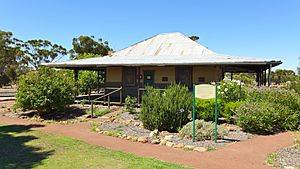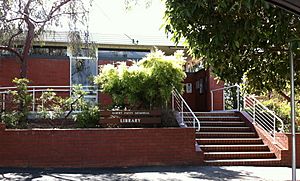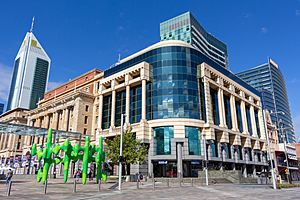Albert Facey facts for kids
Quick facts for kids
Albert Facey
|
|
|---|---|
| Born |
Albert Barnett Facey
31 August 1894 Maidstone, Victoria
|
| Died | 11 February 1982 (aged 87) |
| Other names | A.B. Facey, Bert Facey |
| Occupation | Writer |
| Years active | 1902-1958 |
| Known for | A Fortunate Life |
| Spouse(s) | Evelyn Mary Gibson (m. 1916; died 1976) |
| Children | 7 |
Albert Barnett Facey (born 31 August 1894 – died 11 February 1982), known as A.B. Facey, was an Australian writer and a veteran of World War I. He is most famous for his autobiography, A Fortunate Life. This book is now seen as a classic of Australian literature. By 2020, it had sold over one million copies. A television mini-series was also made about his life.
Contents
Early Life and Challenges
A Tough Start
Albert Facey was born in Maidstone, Victoria, in 1894. His father died when Albert was only two years old. In 1898, his mother moved to Western Australia. She left Albert and his younger siblings with their grandmother.
In 1899, Albert, his grandmother, and siblings moved to Kalgoorlie, Western Australia. Albert started working around 1902, when he was just eight years old. He rarely lived with his family after that. He never went to school, but he taught himself to read and write as a teenager.
Escaping Hardship
Albert's first job was as a farm boy. His employer treated him very badly. Albert was beaten with a horse whip for months. He finally escaped by walking over 20 kilometres through the bush. He was lucky to find new settlers who helped him. The police were told about the abuse, but the employer was never punished. Albert had scars on his back and neck from these injuries for the rest of his life.
In 1908, Albert's mother remarried. She asked him to live with her in Perth. However, Albert only stayed a short time. He soon went back to working in rural Western Australia. He saw his mother sometimes until she died in 1914. Albert spent his childhood working in many different places in Western Australia.
Becoming a Bushman and Boxer
By the age of 14, Albert was a skilled farm worker and bushman. When he was 20, he became a professional boxer. He toured different parts of Australia with a boxing group. His boxing career ended when he joined the army in January 1915.
War Service
Fighting in World War I
Albert Facey joined the Australian Imperial Force (AIF) in January 1915. This was soon after World War I began. He traveled to Egypt as a soldier with the 11th Battalion. He fought in the Gallipoli Campaign. His autobiography describes the terrible experiences he had during the war. He wrote about the struggles of the ANZAC soldiers at Gallipoli. Sadly, two of his older brothers, Roy and Joseph, were killed during this campaign.
Albert wrote that he was wounded more than once at Gallipoli. He said a shell exploded near him on 19 August 1915. This caused serious internal injuries and wounds to his leg. However, his official war records do not show evidence of these specific wounds. They only mention heart trouble.
Albert was sent back to Australia on 31 October 1915.
Family Life and Career
Marriage and Family

After returning from the war, Albert met Evelyn Mary Gibson. They married in Bunbury on 24 August 1916. They had a very happy marriage for almost 60 years. Evelyn died on 3 August 1976. Albert missed her greatly for the rest of his life. They had seven children born between 1919 and 1939.
Albert became a strong supporter for better conditions for Australian soldiers who returned from war. The family lived in Victoria Park. Then they moved to a farm in Wickepin from 1922 to 1934.
Working Life
After the war, Albert worked as a tram driver from 1916 to 1922. When he returned from Wickepin, he became a trolleybus driver in Perth from 1934 to 1946. Later, he ran his own successful poultry and pig farm and business from 1947 to 1958. He worked in areas like Tuart Hill and Wanneroo.
Albert was also active in his community. He was president of the Perth Tramways Union for five years. He was also an elected member of local government for over 20 years. He served as a justice of the peace.
Losing a Son in War
Albert's oldest son, also named Albert (known as Barney), joined the army in World War II. He died in a bombing raid during the Battle of Singapore in March 1942. His family knew he was missing, but his death was not confirmed until May 1945. Albert wrote that he and his wife had hoped their son was still alive. After waiting over three years, his wife's health got much worse.
Two other sons, Joseph and George, also fought in World War II. They both served in New Guinea and returned home safely in 1945.
Later Health and Retirement
Albert believed his later health problems were from his war injuries at Gallipoli. This included old bullet wounds and a ruptured spleen. However, his war records do not show evidence of these injuries. They only mention heart trouble.
Albert had a major heart attack in 1958, when he was 64. After this, he retired from work.
Writing His Memoirs and Fame
Albert Facey started writing notes about his life. His wife and children encouraged him to turn these notes into a book. He finished his memoirs on his 83rd birthday in 1977. Two years later, at 85, he learned that his autobiography, A Fortunate Life, would be published. It came out in 1981, just nine months before he died.
Albert was very happy that his life story was so well-received. However, his health was getting worse. He was losing his eyesight and needed a wheelchair because of a broken hip. His book became a bestseller. It won important literary awards. In the last six months of his life, Albert became a national celebrity. He was even nominated for the Australian of the Year award in 1981.
Death
Albert Facey died of natural causes on 11 February 1982. He was 87 years old. He was in an aged care facility in Midland because of his broken hip. He was buried at the local Midland Cemetery. Six of his seven children and 28 grandchildren survived him.
Television Adaptation
His book A Fortunate Life was made into a four-part television film in 1985. The film covered Facey's life between 1897 and 1916. The cast included actors like Bill Hunter, Val Lehman, and Ray Meagher.
Legacy

Albert Facey's old homestead in Wickepin was turned into a tourist attraction. A government building in Perth, called Albert Facey House, is named in his honour. The Albert Facey Memorial Library in Mundaring also carries his name. Several roads and even a motel are named after him or his son. The original writings of A Fortunate Life are kept at the University of Western Australia Library.
 | Madam C. J. Walker |
 | Janet Emerson Bashen |
 | Annie Turnbo Malone |
 | Maggie L. Walker |


